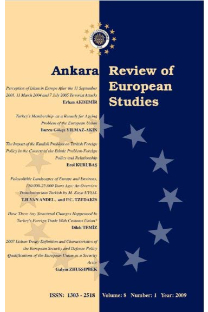Sosyo-politik Bütünleşme Modeli Arayışındaki Kuramlar ışığında Avrupa Kamusal Alanına ilişkin Öneriler
Avrupa’da çoğulcu sosyo-politik bir yönetim biçiminin savunucusu olan bütünleşme kuramlarında, kamusal alan ile demokrasi kalitesi arasındaki ilişki hakkında homojen bir bakış bulunmamaktadır. Bununla birlikte, bu kuramların kamusal alana dair varsayımları ışığında, Avrupa çaplı bir kamusal alana erişime ilişkin sorunların çözümü hakkında bazı temel göstergelere ulaşmak mümkündür. Buna göre; Avrupa kamusal alanının yatay ve dikey genişlemesinin sağlanması için, bürokrasinin ve merkezileşme eğiliminin kontrol edilmesi, anayasal vatandaşlığın gerçekleştirilmesi, yaygın medya iletişimine vatandaşların katılımının sağlanması, Avrupa kurumları içinde ve kamu ile Avrupa kurumları/aktörleri arasında karşılıklı iletişimin artırılması gerekmektedir
Anahtar Kelimeler:
Kamusal alan, bütünleşme kuramları, merkezileşme, anayasal vatandaşlık, iletişim
It is not possible to find a homogenous approach towards the relationship between the public sphere and quality of democracy among integration theories in search of a socio-political integration model. Yet, it is possible to reach, in their assumptions, some fundamental invariables about solutions for problems of access to a European wide public sphere. In this sense, in order to expand the European public sphere, it is necessary to control the bureaucracy and centralization tendencies, to realize the constitutional citizenship, to help citizens participate in widespread media communication, and to increase mutual communication within and between the public and European institutions/actors
Keywords:
Public sphere, integration theories, centralization, constitutional citizenship, communication,
___
- Seyla Benhabib, Between Facts and Norms: Contributions to a Discourse Theory of Law and Democracy by Juergen Habermas., The American Political Science Review, Cilt 91, No 3, 1997
- Samantha Besson, Deliberative Demoi-cracy in the European Union, Towards the Deterritorialization of Democracy, Samantha Besson ve José Luis Marti (der.), Deliberative Democracy and its Discontents, Hampshire, Ashgate, 2006,
- James Bohman, From Demos to Demoi: Democracy Across Borders, Ratio Juris, Cilt 18, No 3, 2005
- Micheal Burgess, Federalism, Antje Wiener ve Thomas Diez (der.), European Integration Theory, New York, Oxford University Press, 2004,
- Grainne De Burca and Joanne Scott, Constitutional Change in the EU, From Uniformity to Flexibility?, London, Oxford, 2000.
- Karl W Deutsch, Nationalism and Social Communication, Massachusetts, The M.I.T. Press, 1953.
- Karl W Deutsch, Political Community and the North Atlantic Area, International Organization in the Light of Historical Experience, Princeton, Princeton University Press, 1968.
- Thomas Diez and Antje Wiener (der.), European Integration Theory, Oxford, Oxford University Press, 2005.
- Erik Oddvar Eriksen, An Emerging European Public Sphere, European Journal of Social Theory, Cilt 8, No 3, 2005.
- John Erik Fossum, and Philip Schlesinger (der.), The European Union and the Public Sphere: A Communicative Space in the Making?, London, Routhledge, 2007.
- Ernst B.Haas, The Uniting of Europe. Political, Social, and Economic Forces 1950- 1957, Stanford CA, Stanford University Press, 1958.
- Jürgen Habermas, Kamusallığın Yapısal Dönüşümü, İstanbul, İletişim, 2000.
- Jürgen Habermas et al., The Public Sphere: An Encyclopedia Article, New German Critique, No 3, 1974.
- Jürgen Habermas, Why Europe Needs A Constitution, New Left Review, Cilt 11, 2001.
- Karl-Heinz Ladeur, We, the European People Relâche?, European Law Journal, Cilt 14, No 2, 2008.
- Cristina Lafont, Religion and the Public Sphere: what are the deliberative obligations of democratic citizenship?, Philosophy Social Criticism, Cilt 35, No 1-2, 2009.
- Marju Lauristin, European Public Sphere and the Social Imaginary of the New Europe, European Journal of Communication, Cilt 22, No 4, 2007.
- Andrew Linklater, Marxism, Scott Burchill ve Andrew Linklater (der.), Theories of International Relations, Palgrave Macmillan, 1996.
- Lizbon Anlaşması, 01 Aralık 2009.
- Byron Miller, Collective Action and Rational Choice: Place, Community and the Limits to Individual Self-Interest, Economic Geography, Cilt 68, No 1, 1992.
- Joe Painter, European Citizenship and the Regions, European Urban and Regional Studies, Cilt 15, No 5, 2008.
- Pernille Rieker, Europeanization of Nordic Security: The European Union and the Changing Security Identities of the Nordic States, Cooperation and Conflict, Cilt 39, No 4, 2004.
- Ben Rosamond, Theories of European Integration, New York, St.Martins Press, 2000.
- Larry Siedentop, Democracy in Europe, New York, Columbia University Press, 2001.
- Slavko Splichal, In Search of a Strong European Public Sphere: Some Critical Observations on Conceptualizations of Publicness and the (European) Public Sphere, Media Culture Society, Cilt 28, No 5, 2006.
- Alec Stone Sweet and Wayne Sandholtz, European Integration and Supranational Governance, Journal of European Public Policy, Cilt 4, No 3, 1997.
- Hans-Jörg Trenz and Klaus Eder, The Democratizing Dynamics of a European Public Sphere: Towards a Theory of Democratic Functionalism, European Journal of Social Theory, Cilt 7, No 5, 2004.
- Marianne Van de Steeg, Rethinking the Conditions for a Public Sphere in the European Union, European Journal of Social Theory, Cilt 5, No 4, 2002.
- ISSN: 1303-2518
- Yayın Aralığı: Yılda 2 Sayı
- Başlangıç: 2001
- Yayıncı: Ankara Üniversitesi Avrupa Toplulukları Araştırma ve Uygulama Merkezi
